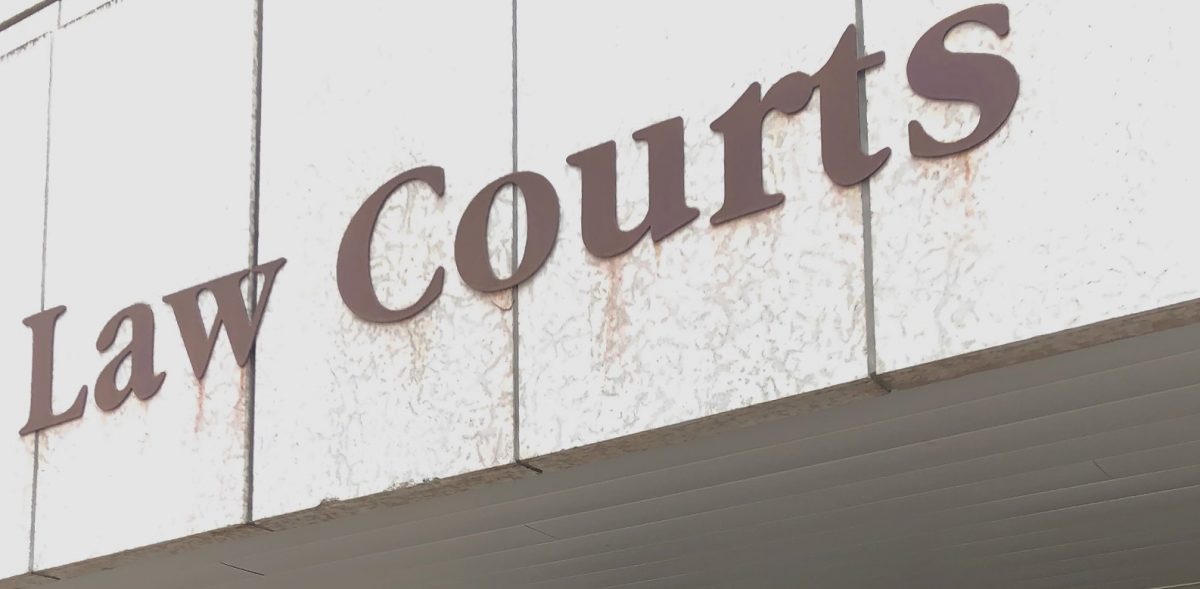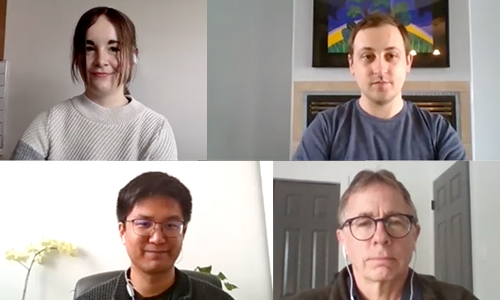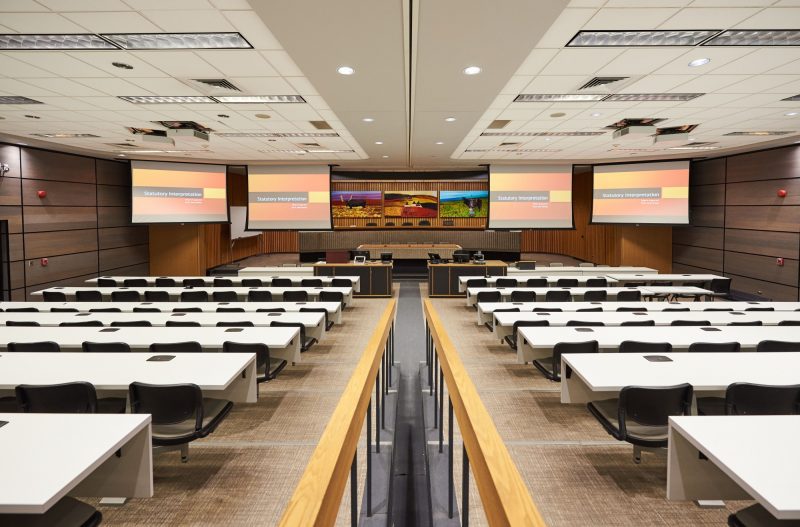
Rising to the Charter Challenge
Law students use classroom lessons to take real-life Charter issue to court
Looking through her University of Manitoba Community Law Centre files early last summer, student supervisor and third-year law student Larissa Campbell noticed that a troubling number of Legal Aid clients with limited incomes were being assessed crushingly high mandatory minimum fines under The Tax Administration Miscellaneous Taxes Act for offences under The Tobacco Tax Act.
“Cruel and unusual punishment”
The clients had come to the Centre, known as the ‘Legal Aid clinic,’ because they could not afford to hire private lawyers, and each person was of limited means. Their files would be assigned to Faculty of Law students who work at the clinic as either volunteers or as part of a for-credit Clinical Criminal Law course instructed by Legal Aid supervising lawyer, Mike Walker.
These particular clients had each been caught in possession of more than the legal limit of cigarettes, purchased at a First Nations community just over the Ontario border. The community sells cigarettes at a much lower price than in Manitoba, because the Federal Excise tax is not collected. The Tax Administration Miscellaneous Taxes Act (TAMTA) imposes a mandatory minimum penalty and a triple tax penalty, which Campbell noticed, would amount to being “grossly disproportionate” to each accused person’s respective circumstances. The penalties Campbell saw on this group of files ranged from $8,000 to $14,000 which she observed would definitely fall into the category of “cruel and unusual punishment” given a recent Supreme Court of Canada (SCC) decision she had learned about in law school, R. v. Boudreault, 2018 SCC 58.
“I looked into it with a little bit of research,” said Campbell, who plans to focus her career primarily on criminal law, “and I realized that there’s potentially an argument to be made here that hasn’t been made in quite some time. The last time the issue was litigated was over 20 years ago,” she said, referring to R v Maslack, appealed in 1999 from Provincial Court to the Manitoba Court of Queen’s Bench. In that instance, Mr. Justice Kennedy did not find the fines imposed by the trial judge to be “cruel and unusual punishment”. The defendants’ appeals were denied and they had to pay their fines. At the time as well, Campbell pointed out, convicted persons could work off their fines with the Fine Options program, which no longer exists. “Now, it’s all or nothing,” she said. “You either pay your fine or you don’t.”
When Campbell observed in the Boudreault case that the SCC deemed a mandatory $200 – $300 financial penalty laid against convicted offenders to be cruel and unusual punishment contrary to Charter Section 12, she thought, “maybe there’s a chance that we can make a similar argument for the tobacco fines given that there are also financial penalties, and they’re of a much greater impact than those in the Boudreault case. That was sort of a launchpad for us all.”
After raising the issue with Walker, Campbell said he was encouraging. “He was pretty much supporting us along the way and said, “Go for it,” she said.
Team work

The three law students (counterclockwise from top right): Brayden McDonald, Larissa Campbell and Dan Jr Patriarca, and their Legal Aid Law Centre supervisor, Mike Walker.
Realizing the vast amount of research and writing that would be involved, Campbell enlisted the help of fellow law students. Dan Jr Patriarca, also in 3L, who is interested in civil litigation (“because I think that thinking on your feet is a very exciting thing”) answered her call for help, as did Master of Laws student, Brayden McDonald [JD/2019]. With much experience working with Robson Crim research group professors Richard Jochelson and David Ireland, McDonald brought his expertise in research of evidence to the team.
Filing a Charter challenge of this size is unprecedented for students at the Centre, Walker said. “We’ve done individual cases where we brought a Charter challenge that really only affected their situation. That’s actually very common. But this one was different, because it was actually challenging a mandatory minimum sentence. And the decision has the potential to affect a lot of other people.”
While students over the years have raised concerns about too-high fines being imposed against Legal Aid clients, no one had ever thought of it in the way Campbell did. “Students who have just gone through a course of study, ask the ‘why’ questions that people that are immersed in practice, don’t ask,” said Walker. “I think that’s really interesting and unique about this case.”
Lots of lawyers representing people for similar charges didn’t ask the questions Campbell raised, said Walker, which essentially called into question the justness of punishing people of minimal income by driving them into even more crushing poverty.
“The reason I really enjoy criminal law is because I find it to be one of the most human areas of law,” said Campbell, “just given that you’re dealing with people and not necessarily corporations or obscure entities, but rather you’re dealing with people on a person to person basis. I find that that’s really important…it can effect change both in communities and in broader terms.”
Together, the team of three drafted a Case Brief, and appeared physically in Provincial Court on March 10 and 11, 2021, having divided different parts of the presentation amongst themselves. “It was a very collaborative process,” said McDonald. “Larissa was really the details and the brains of it all. She was the one that created the argument and everything. My role was more bouncing ideas back and forth, and talking about how to craft the argument from the different legal concepts. That was really where Dan and I came in: how to frame things to provide a discussion forum to talk about how are we going to argue this, what does it mean, if we’re going to say x? And to really refine the argument.”
Courtroom as classroom
When the date arrived, the students went to the courthouse in Winnipeg in person, while their clients appeared virtually, thanks to a special application the students had to obtain in advance. With their clients on screens in the courtroom, Campbell found the proceedings unique. “I don’t think prior to COVID we got to experience the joys of technology in the courtroom,” she said.
Each student delivered a section of the argument. “Dan spoke to the facts as well as statutory scheme,” said Campbell, “I did most of the section 12 argument and then Brayden did the main part which was distinguishing our case from the binding decision of the Manitoba court of Queen’s Bench in R. v. Maslack.”
Walker, a Legal Aid criminal defence lawyer for over 35 years, found it “a bit of a different experience” to sit in the gallery, take notes and coach the students during breaks. “It was really fun,” he said. “Knowing that there’s all these things they learned through their studies at the Faculty of Law that they were putting into action, I had the sense of what an awesome learning experience this was.”
“I think I’m glad I took Charter Crim before bringing a Charter application,” said McDonald, referring to Professor Richard Jochelson’s Charter Issues in Criminal Law seminar that covers the law related to Charter violations and recent case law. “I definitely think having a little bit of that background, just so that you kind of knew a bit about what was going on, was helpful.”
While the course could never have prepared the students for the specific detail of this particular case, “you’re applying the wider principles you might have already learned to deal with those things,” McDonald explained.

Photo of the Harry Walsh, Q.C. Moot Courtroom at Robson Hall by David Lipnowski.
Campbell agreed. “I think law school has provided us with the set of tools that we need to then go out and make the arguments we need to make, but it didn’t prepare me for a specific tiny, narrow area of The Provincial Offences Act or the tobacco tax scheme. It gives you the tools to write the Charter brief, and the tools to know the broad law. And then you have to teach yourself and learn the nuances and the ins and outs of all the different provincial statutes.”
“For me,” said Patriarca, “because all my courses are from the civil side of things, my experience goes as far as the family externship I’m in, but also other clinical experiences facilitated by Robson Hall. In those clinical experiences, I’ve learned to interview clients and communicate with clients. That was helpful in in this project that we were doing. So, although what I learned at Robson didn’t apply in some substantive way, it applied in a practical, tangible way.”
The importance of clinical experience
While they await a decision from the hearing, Campbell and Patriarca prepare for third-year exams, while McDonald prepares to defend his thesis on the importance of Expert Evidence.
Reflecting on their experiences, the three recommend that law students find a way to get involved in clinical experiences alongside their classroom academics.
Patriarca encourages law students to take part in the Legal Aid Clinic regardless of practice area interest. “It doesn’t matter whether you’re coming from a Crim background or civil background,” he said. “There’s a lot to take from it, whether you’re looking to improve your client interviewing skills, communication skills, or looking for trial experience. I think there’s something there for everyone that’s applicable in all practice areas.”
Speaking frankly, McDonald said, “At the risk of being overly blunt, I would say that if you want a job when you graduate, your law degree is not good enough. You need to find ways while you’re in law school to get other experience and differentiate yourself, because there is about 100 of us coming out each year. And pretty much every year since I finished my JD, I’ve heard the same thing, which is there’s not a lot of jobs to go around. So, I think the clinic offers a great way to differentiate yourself and to show that you’ve got some experience that employers are going to value.”
Campbell added that getting involved in clinical experiences also offers a better experience to network with a community of notoriously busy lawyers. “Generally speaking, if you’re not in court, Criminal Lawyers are particularly a tough group to network with,” she said. “By being in court, you have that facial recognition, they see you around, you see them around. And it makes it so much easier when you go into the articling process, when you’re looking for a job later on, they’ll recognize you and they’ll remember, ‘oh, that person volunteered at the clinic.’”
Beyond the kind of networking that involves wine, cheese, and chatting about hockey, McDonald added, “the lawyers you’re interacting with are seeing your competence and your professional side.”
The students were made very much aware of the impact their work had on the clients, when after the hearing, each one called to say thanks. “All of them expressed things in the most heartfelt manner,” said Campbell. “It’s just really heartwarming, and it makes me feel like we’re making an impact on the broader community.”
When interviewing some of the clients for affidavits, McDonald was struck by the human connection. “It’s not something that you see coming through when you’re reading and studying cases,” he explained, “but … it can alter your perceptions very quickly when you’re doing hands on stuff like this.”
Some key lessons Walker recalls emerging from this case went beyond the practical application of principles learned in classes or written assignments. “There were a whole bunch of practice issues the students also learned, and a lot of them are really not things that could normally be taught easily in an academic course,” said Walker, citing examples of client management and project management. “This case was a project,” he said, “very much a long list of steps. I would say that Larissa was our project manager, and she passed on to all of us the things that we had to do, so that we could meet all the deadlines and be ready to go on the day of the hearing.”
Further, Walker said, there were a number of ethical decisions to be made related to professional integrity. “We had some discussions about things that I considered teachable moments,” he said. “Things that came up and decisions that had to be made where they were really good opportunities to have discussions about: how we’re going to deal with this situation and the bigger ramifications of that in terms of what kind of lawyer do you want to be?”






